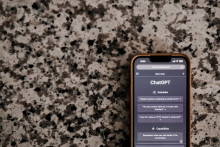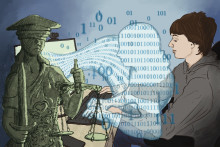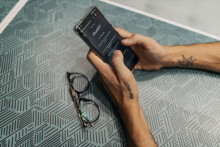Reading both Fridtjof’s and Niels’ op-eds, I had to think of some old lyrics. ‘I just want someone to talk to and a little of that human touch.’ A classic line from Springsteen’s 1992 ‘Human Touch’. Though more than ever, we should avoid being blinded by the light.
By all means, ChatGPT ticks the boxes of being a disruptive technology. One that shocks us and forces us to adapt in education. But let’s not forget that this is still the tip of the iceberg in terms of this specific technology. Shortcomings and limitations of today may be gone in months and years to come. So, while the strings of words may be nonsensical at times now, we may laugh at the foolish quality of this in years to come.
Before working here, I worked for years as a teacher in special needs education. A job that, above all, requires focus on being connected with your students and colleagues. An experience that taught me that there’s not a single tool, AI model or whatever now or ever that’ll replace the connection between a teacher and their student. Any educational tool can and should only augment this connection.
And as both gentlemen work out perfectly: this type of technology requires critical thinking. Critical thinking in the prompts you use; critical thinking in the output you get. And this is where my op-ed comes in, to quote one of the sayings around my fellow educational consultants: self-regulated learning cannot be taught self-regulated.
For many years terminologies like ‘21st century skills’ have been thrown around, but I believe that more than ever we’ll need those in our education. Critical thinking, problem solving, creativity and digital/information literacy: examples of skills that aren’t always as explicit in education as your regular learning objectives. But this is the exact type of toolbox we need to deal with new technology like this.
And how do we support others get to this toolbox? Just a little of that human touch. Like Fritdjof’s call to community, I subscribe to the idea of working and learning from others. One thing my time as a special needs educator taught me is that even your small course, of just 50 minutes per week, contributes to this toolbox of your students.
There’s already many ideas and options explored in both op-eds on how you can use this type of technology. Why not go and do the exact thing Niels criticises: try and let your essay be written by an LLM. But instead of handing it in you can choose to reflect on it, and learn from the different approaches to write your own piece in a new manner.
To close off with another terminology that’s being thrown around: rewarding and recognition. Teaching is and has always been more than just transporting information on a specific field. It’s about helping others find their way far beyond this specific field. Let’s keep recognizing our human touch here.
Robin van Emmerloot,
Educational Consultant at CES






